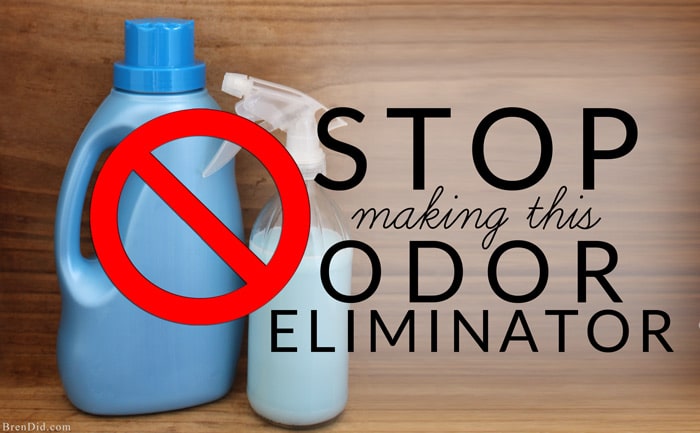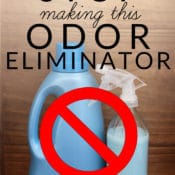Type the words Homemade Odor Eliminator or DIY Febreze into Pinterest or Google and hundreds of recipes will pop up containing two main ingredients:
Liquid fabric softener and water
This easy DIY uses products you might already have at home…. BUT…
Pretty please with a cherry on top…
STOP making this odor eliminator!
WHY?
Fabric Softener = Toxic Chemicals
Fabric softeners (both liquid and sheets) make fabrics feel softer by coating them with a layer of slippery chemicals. These chemicals are dangerous for humans to inhale or absorb into their skin.
Most commercial fabric softeners contain two substances that should be avoided:
- Quaternary Ammonium Compounds or quats
- Artificial fragrance
The Dangers of Quats
Quats are asthmagens, this means that they can cause asthma to develop in otherwise healthy people.
Quats also have unnecessary antibacterial qualities that may lead to development of antibiotic-resistant superbugs in our homes.
The Dangers of Artificial Fragrance
The word “fragrance” is used in place of the actual names of the toxic chemicals used to scent the product. (The U.S. considers these to be trade secrets and does not require manufactures to label the specific chemicals.)
These chemical substances can act as hormone disruptors, allergens, carcinogens, and developmental toxicants:
- Hormone disruptors are chemicals that mimic or interfere with the hormones in our bodies. They may be linked to breast cancer, endometriosis , reproductive problems, prostate and testicular cancer, thyroid disorders, diabetes, and early onset puberty.
- Allegens are substances that can cause strong immune responses in humans. These reactions can vary from runny noses and sneezing to life-threatening reactions such as allergic asthma and anaphylactic shock.
- Carcinogens are substances that cause cancer. These chemicals can either directly produce cancer or disrupt cancer-related pathways in the body.
- Developmental toxicants are chemicals that can cause adverse effects on the developing child in utero or in the formative years after birth. They can negatively affect the brain, behavior, and sex organs in fetuses, infants, and young children.
The Risk for You
The chemicals in fabric softener contaminate the air in our homes when sprayed about as room deodorizer. Instead of getting the fresh clean home you desire, you are launching dangerous chemicals into the air that you and your family breathe!
You don’t have to take my word for it, the American Lung Association also suggests that these artificial fragrances are not used indoors to mask odors!
Better Ways to Freshen the Air
There are many affordable, all-natural ingredients you can use to effectively eliminate odor. Three of my favorites are vinegar, vodka and baking soda. All three eliminate odors instead of merely covering them up with artificial fragrance.
- Vinegar – White vinegar is an effective natural deodorizer and mild disinfectant. Combine a teaspoon of vinegar with 2 cups of water in a spray bottle then lightly mist the air (you can also stir in a few drops of essential oils). It smells a bit vinegary at first but dries odorless leaving no bad smells or vinegar scent. Learn how to naturally scent vinegar with herbs or citrus peels to make it smell better.
- Vodka – Cheap vodka is my favorite natural deodorizer and disinfectant. Vodka is essentially odorless in cleaning sprays (no vinegar smell!) and naturally eliminates odors as it dries. Learn how to make an easy vodka based Room and Fabric Refresher Spray.
- Baking Soda – Baking soda or sodium bicarbonate neutralizes both acidic and alkaline substances which eliminates the offensive odors instead of simply masking them. You might already be using baking soda to deodorize your fridge or freezer. Learn how to use baking soda to eliminate carpet odor, freshen your vacuum, and stop shoe & foot odor.
Like my green cleaning tips? Sign up for my newsletter below and never miss a thing!
*You can read more about the dangers of using fabric softener at the Environmental Working Group (EWG) and Science Daily.





toni
i made a spray of vinegar & lemon juice to clean grease on the stove, wondering if i could use it to spray fabric ?
Bren
I would not use lemon juice on fabric it can stain it brown over time.
Cat
Would this work for deodorizing the carpet from regular normal dog smell? No urine or other smells, just general dog smell when he comes in here and lies down. I cant really use baking soda on the rug as it clogs up the vacuum cleaner and I’m living in someone else’s home. Vinegar spray with grapefruit vanilla essential oil is what I would like to use – would that be okay?
Bren
I would start with just vinegar and water before adding essential oils. Good luck!
Shawna
While essential oils are considered so safe by many what they fail to realize is that most of our pets are more sensitive to plant compounds like essential oils than humans. More carnivorous animals in particular don’t have the biochemical processes to eliminate them as efficiently. It’s information that really needs to be better spread around. Since they can’t break apart the compounds or bind them into something less harmful like humans and more omnivorous or herbivorous animals have evolved to the more carnivorous animals have to rely on flushing them out faster than they can cause tissue damage. If exposure is too great or frequent to accomplish removing enough they can suffer organ damage. Much smaller amounts can become toxic to them than it takes for a human. The inability to deal with compounds in things like chocolate or coffee are better known examples. Sensitivity varies among individuals but nearly everyone knows these things can be toxic for dogs. They cannot make use of or eliminate them as well as humans can. Essential oils have similar issues.
Strong tree oils such as cedar, pine, tea tree, and eucalyptus are among the worst with considerable laboratory testing on rodents and rabbits using cedar and pine oils showing increased liver enzymes and respiratory infections with repeat or long term exposure. While dogs may not be confined to a pen of the stuff if you spread the scents around it has the same effect and they are even more sensitive to plant compounds than the animals used in studies.
Most floral, citrus, and vanilla type scents are more easily eliminated from the body and safer for occasional use but any essential oil in strong enough amounts or too frequent of exposure has the potential to cause health issues. Even if they don’t ingest or breathe in enough to cause internal problems skin irritation from laying on sprayed surfaces is also a possibility.
Grapefruit also has a variety of properties that impact the body as well as a high level of acidity. While controlled dosages for certain applications have been used to treat health issues in pets the ASPCA lists it as toxic and various sources warn it can cause both GI and skin irritation. Unknown levels of exposure from spraying it on surfaces could surpass safe levels the same as with many essential oils.
Overall while the occasional use of mild essential oils is generally safe it’s best not to apply them too frequently to surfaces pets will come in contact with or excessively fill the air with them on a regular basis. I do use microbalance ec3 products that rely on citrus oils to help with mold control about every 3 months. Usage of essential oils directly on a pet is best limited to isolated treatments of small areas that will not be excessively licked or either covered or removed a short time later to avoid ingestion.
You can use stronger essential oils for deodorizing or cleaning purposes around the house if you remove pets from the room or remove the object being treated to another room and fully rinse or evaporate the oils before letting pets have contact with it. Make sure to air out any room that has been filled with the scent if animals have access to it.
Beneficial soil or probiotic bacteria based or many types of enzyme based cleaners and deodorizers are usually safer options and also generally more effective than vinegar or baking soda for deodorizing around pets. Some products like EM-1 can even be applied to the dog (or yourself) to remove odors on the skin before they spread to surfaces. Some drink it as a digestive probiotic or use it as a mouth rinse and many use it to treat acne and skin disorders. The useful bacteria out compete more harmful bacteria and improve health or prevent infection. The only problem with EM-1 specifically is the beneficial bacteria are grown on molasses and so might stain light fabrics. I buy all pet bed covers, cots, and dog blankets in browns, greys, and the occasional dark blues or black for a good reason. We also don’t have anything on the floor that can’t go in the washing machine, be sprayed down in the shower, or mopped with veterinary grade cleaner.
Borax or related boric acid can also be used similar to baking soda but is sometimes even more effective at odor neutralizing. Especially when it comes to either pet potty accidents or mold killing and musty odor problems. Toxicity requires considerable overexposure and some do buy it as a supplement since boron is a needed compound by the body. There isn’t really anything my youngest overly curious dog hasn’t managed to stick her tongue in so I make sure I don’t use anything that will do more than cause her a mild, temporary stomach ache if she eats/drinks a little. We also stick borax in the prewash of all the pet laundry after trying numerous more expensive laundry additives for pet odors and only having them be semi effective at 2-10x the cost. It definitely works better than baking soda for that purpose.
Improved diets and supplements such as omega fatty acid containing fish oils will also create healthier skin that reduces doggy odors and the dandruff that both helps cause and spread odor as well as allergens. Chronic dandruff in humans or animals is frequently the result of ongoing mild yeast infections on the skin from poor diet or health issues such as hormone imbalances. Bacteria and yeast are what lead to odors being left behind. Healthier skin with a good mix of beneficial bacteria living on it instead of micro organisms that cause strong odors will reduce daily odor and allergen buildup on pets and the surfaces they lay on without needing to cover it up with potentially toxic compounds. Including essential oils or herbals that may seem harmless but are not equally so to your cat or dog as they are to us.
Brandi
You’re post is a breathe of fresh air! I have seen so many recipes for this…I commented on one just to explain that fabric softener is harmful to your health and it is not all natural at all! I was delighted to see your post & i hope people read this!! Thanks again
Bren
Thanks, Brandi!
Bark Levin
Essential Oils can be dangerous and potentially fatal when used around pets.
Essential oils are more dangerous to cats due to the lack of an enzyme in their liver (glucuronyl tranferase) that in other animals helps to process and break down certain components of these essential oils.
Because of this – Toxic buildup of these components occurs and can ultimately be fatal.
And because it takes time for toxic buildup to occur – Cats don’t necessarily show any symptoms of toxic buildup before it’s too late.
This recipe only calls for just a few drops of ‘essential oil’ – and though it doesn’t specify into how many fl/oz of water:vodka – it should be diluted enough for safe use around pets..
However, I wouldn’t bet my pets life on it without looking further into it. AND because of the ‘toxic buildup’ in Cats that occurs slowly over time – I’m not sure if even diluted exposure is safe..?
Didn’t want to scare everyone or be a buzzkill.. Just thought this up about essential oils! 🙂
(The following are links to ASPCA’s complete list of Toxic & Nontoxic plants:)
“Toxic & Nontoxic Plant list – Cats”
https://www.aspca.org/pet-care/animal-poison-control/cats-plant-list
“Toxic & Nontoxic Plant List – Dogs”
https://www.aspca.org/pet-care/animal-poison-control/dogs-plant-list
Diana Katsantones
Where can I find glass spray bottles that aren’t expensive???
Bren
Check out my upcycled glass bottles! I also like these that come in a 6 pack for about $20.
mandy cat
I have never understood the popularity of all the “fragrances” for the home and for laundry. If your house or your laundry doesn’t smell nice on its own, covering things up with a bunch of chemicals has always seemed to me like dousing yourself with perfume instead of taking a good hot shower. There are times when my house is less than fresh (I just cooked up a batch of fish and it’s 93 degrees outside, for example) but simmering some orange peel and a cinnamon stick on the stovetop takes care of that without the assistance of the Dow Chemical Company.
I usually fly down the laundry aisle at the grocery store as fast as I can go while holding my breath. Not long ago I lingered just long enough to wonder who spends good money to have their clothes come out smelling like “Apple Pomegranate.” Peeh-yew.
Bren
I completely agree! Thanks for stopping by to comment.
GG
I use 1part boiled water (room temperature), 1 part white distilled vinegar (5%) and 1 part isopropyl alcohol (90%). Sometimes I’ll put a couple drops of essential oils for fragrance (usually lemon oil or pine oil). I live in a home with a smoker. My family is allergic. I spray the whole house down before they visit, and they don’t have issues with the house anymore (since I found the formula). I’ll try it with vodka on a less sensitive friend, but is there any reason you don’t use isopropyl?
Bren
I stick to vodka or vinegar for green cleaning. Rubbing alcohol has additives that make rate worse than vodka. You can get the recipe for my Fabric and Room Refresher here. Thanks!
Laura
What would be the advantage/disadvantage/difference of using vodka vs. rubbing alcohol? Specifically the highest concentration, I believe it’s 90% or higher. Just trying to learn. 🙂
Bren
Good question, Laura! I prefer to use vodka vs rubbing alcohol because vodka is simply water and ethanol. Rubbing alcohol is ethanol, water, acetone, methyl isobutyl ketone, flavoring to make it taste bad and/or artificial coloring and artificial fragrance. I prefer to avoid all the additives in rubbing alcohol. In addition, rubbing alcohol smells bad when sprayed and the vodka is almost odorless allowing any essential oils you add to it to be smelled. Rubbing alcohol is usually 70% alcohol (it is labeled on the bottle). Vodka is at least 40% alcohol but ranges (it is labeled on the bottle). Hope this answers your question. -Bren
satrntgr
Great tips!! I keep hearing about the dangers of some of these products, so it’s great to know what to use instead!
Bren
Thanks!
kayla
We use a diffuser and diffuse thieves oil, that is my favorite to diffuse on cleaning day.
Bren
A diffuser with natural oils is a great alternative to artificial fragrance!
Lisa/SyncopatedMama
Wow, I had no clue that formula was out there for a DIY version. No wonder so many readers like the “cleaner” version I have on my blog! Thanks for getting the word out there on this, because I’d hate for people to think they were using a healthy spray, when they’re really not!
Bren
I’m so glad you have found a healthier version, Lisa!
Deborah Smikle-Davis (@debsmikdav1)
I hopped over from Bloggers Brag to see this valuable odor eliminator post. I use a diffuser in my home to eliminate odors and vinegar and baking soda are my cleaning staples. I appreciated your wise warnings and I am Pinning and sharing this post!
Bren
Thanks Deborah!
Stephanie M
Hello. I’ve started to notice a weird film on my couch and pillows, kind of smells slightly moldy I guess and when I rub my hand on them it feels grimy. This all started happening after I started using my vodka/baking soda/water/essential oil disinfectant/freshening spray. Has this ever happened to you?
Bren
It’s probably the baking soda, baking soda is a crystalline powder that will build up on things. I use this fabric refresher made with just water, vodka and essentail oils. It leaves no build up and I have been using it for years. I would stick to the baking soda for freshening in places you can vacuum or wipe it up.
Terri
Regular, over the counter hydrogen peroxide kills all types of germs. I use it on my door knobs, toilet seats, kitchen sink and whatever needs to be disinfected if someone in the house gets sick.
Bren
Great tip, Terri. Hydrogen peroxide is good at killing germs and has been approved by the EPA as a sanitizer. You have to be careful using it on fabric or carpet because it can bleach items. I like to use vodka to disinfect so I don’t have to worry about bleaching action.